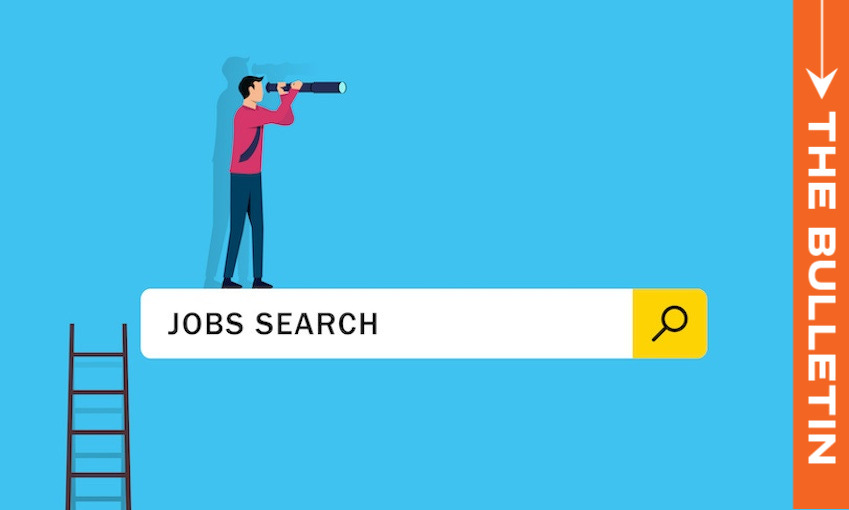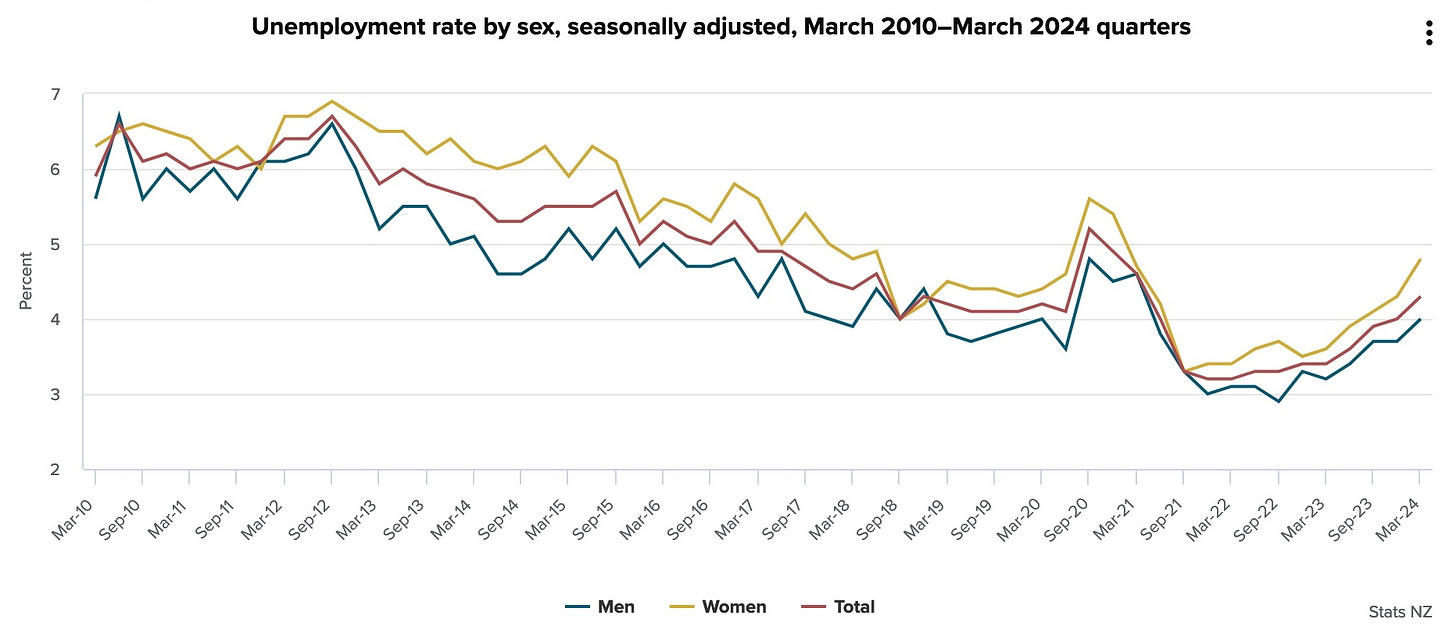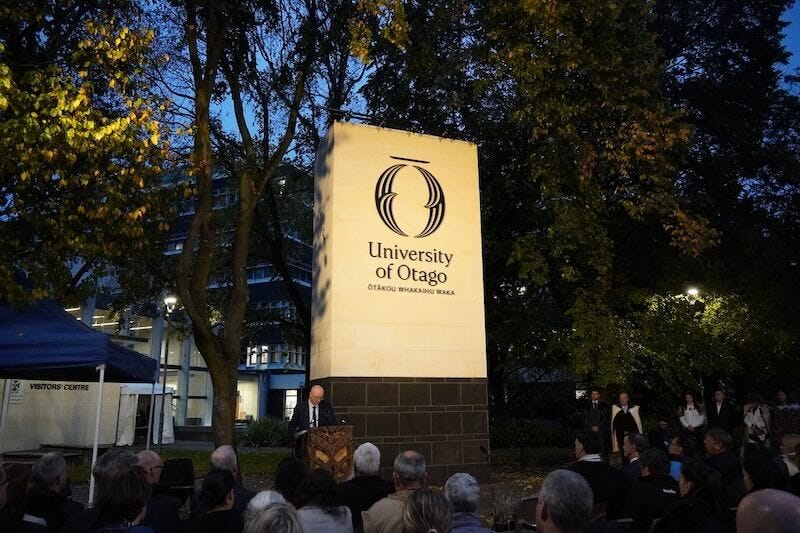
Unemployment up, business confidence down
Labour market figures came in softer than the Reserve Bank had forecast, but they won't be enough to move the needle on interest rates.
Mōrena, and welcome to The Bulletin for Thursday, May 2.
In today’s edition: Tax reform a key focus for Labour rebuild; Peters talks AUKUS; James Shaw says goodbye; Julie Anne Genter apologises. But first, a series of economic reports this week paint a drab picture of the state of the New Zealand economy.
Unemployment heading upwards
Unsurprisingly, the latest labour market figures show unemployment is on rise – and by a bit more than the Reserve Bank expected. Unemployment was at 4.3% in the March quarter, up from 4% in the December quarter. The Reserve Bank had forecast a rate of 4.2%. Beyond those topline figures are some interesting statistical nuggets. BNZ economist Stephen Toplis notes one age group that bucked the overall downward trend: in the 35 to 39 age group annual job growth was a remarkable 8.2%. “One can only assume this is a direct reflection of the massive surge in the working age migrant population we have witnessed over the last year or so.” While the rising unemployment numbers represent thousands more New Zealanders thrown into financial precarity, the prospect of lower interest rates is one upside. But don’t get your hopes up, says Kiwibank chief economist Jarrod Kerr. “The data definitely doesn’t require a harsher hawkish tone come May 22,” he said, referring to the date of the Reserve Bank’s next monetary policy statement. “We don’t think there was much in the data that would force the RBNZ to deviate from its stance.”
Tax changes could fuel house price rises, Reserve Bank warns
The other big economic report out on Wednesday was the Reserve Bank’s half-yearly financial stability report (FSR). It noted that cost of living pressures, including higher interest rates, had led to an increase in mortgage arrears, but the rise was relatively small. It said proposed debt-to-income ratios would help shield borrowers, and the wider economy, from risky mortgage lending, but thought changes to the tax treatment of landlords could help fuel the housing market. "Looking ahead, strong population growth, potentially lower mortgage rates and increased investor activity from tax policy changes suggest there is a risk that house prices will rise relative to sustainable levels," the RBNZ said. Greens co-leader Chlöe Swarbrick said the comments reinforced that “this is terrible policy that funnels money from renters and workers to landlords and speculators… This is a government for landlords, by landlords.”
Businesses are feeling worse and worse
You want even more economic reports? We’ve got ‘em. ANZ’s April business outlook report dropped on Tuesday, and it showed confidence had fallen for the third month in a row, dipping to the lowest level since September, reports The Post’s Tom Pullar-Strecker. The figures suggest the post-election bounce in confidence has been and gone, deflated by “stubborn domestic price pressures, rising oil prices and a more uncertain mood among central banks overseas that the Reserve Bank will start to ease monetary policy this year”. Another report, and this one is good news, says the Herald’s Liam Dann. Stats NZ released its annual research and development survey on Friday, showing that businesses spent 17% more on R&D in 2023 than the year before, potentially prompted by last year’s labour shortages. It was the highest percentage increase since 2018. Still, it wouldn’t be an economic report without some bad news. R&D spend across all sectors, not just business, was around 1.5% of GDP at the end of 2022. That’s a paltry amount, says Dann, and “still well below the target if we want to match other more productive nations”.
Work visa rules breeding resentment
Along with their impact on the broader economy, some migrants are (unwittingly and blamelessly) creating upheaval in their place of work, reports RNZ’s Gill Bonnett. Most workers arriving here on the Accredited Employer Work Visa must receive at least the median wage – about $30 an hour. As a result, they’re often being paid substantially more than colleagues in the same role, which can cause an almighty stink when word gets out. Council of Trade Unions president Richard Wagstaff said unions support the median-wage rule as it prevents employers exploiting migrants as a source of cheap labour. “Where employers are employing local people and they have migrant workers under the scheme, we would expect that they would employ their local people, the domestic labour force, on the same rates.”
Related – Cum chairs, stolen pay and shitting bans: A special May Day round-up of employment horror stories, collated by Hera Lindsay Bird.
Otago launches new tohu, ikoa Māori
Aotearoa’s oldest uni, has launched a bold new brand with the introduction of a new reo Māori name and tohu, created in collaboration with mana whenua.
The name University of Otago remains but the reo name has changed to Ōtākou Whakaihu Waka – 'A Place of Many Firsts'.
These changes are visible markers on the University’s path to become Te Tiriti-led.
Read more about the University of Otago’s new branding here. (sponsored)
Tax reform a key focus for Labour rebuild
Tax policy will be central to any Labour comeback next election, writes the Herald’s Audrey Young in a (paywalled) analysis of the party’s current situation and likely future. Tax policy reform is the No 1 priority of a group of hardliners including David Parker, Phil Twyford, Arena Williams and Michael Wood, who is working hard on rehabilitating his image after being forced to resign from government last year. The party is about to begin a process to thrash out its tax policy agenda with six regional conferences set to take place in late May and June, Young writes. But which tax policy? A capital gains tax, which is common overseas, would likely be an easier sell than a wealth tax, Young says. “But the trouble is that [a capital gains tax] brings in little revenue in the early years, assuming the family home remains off limits. A wealth tax would give an immediate income stream that could be used to give tax-breaks to low and middle-income earners.” Some are expecting the tax debate to be settled by the end of the party conference in November this year, while others see it continuing to the party conference next year, Young says.
Peters hits back at AUKUS critics in foreign policy speech
Foreign minister Winston Peters has defended the government’s involvement in Pillar 2 of the AUKUS pact, saying critics had rejected Pillar 2 outright without "possession of the basic facts". Speaking in the Legislative Council Chamber in parliament, Peters said that NZ was still “a long way” from deciding whether to join other nations in the outer ring of AUKUS, a military pact between Australia, the UK and the US aimed at checking China’s influence in the Pacific region. He said critics and commentators are “well ahead of where the government presently sits in relation to Pillar 2”. He emphasised that discussions on Pillar 2 were opened by Labour PM Chris Hipkins, just prior to last year’s election. “That is why we state we are continuing a process already begun by our predecessor Labour Government." Peters' speech was disrupted at one point by a person protesting AUKUS, reports RNZ’s Anneke Smith. Eight security officers carried her out after she refused to leave.
How you can stay informed the year the world votes
Two billion voters are set to go to the polls in 64 countries this year. One of the perks of being a Spinoff member is receiving The World Bulletin, a weekly newsletter rounding up global news. Edited by me, it’s sent to members every Thursday. Becoming a member means you’ll not only help sustain local journalism but stay on top of consequential world news, see less advertising, comment on the Spinoff and more. Join today.
Click and Collect
James Shaw departed politics after delivering his valedictory speech yesterday. Shaw has a full dance card awaiting him: his new jobs include operating partner at global infrastructure investment management company Morrison; director of climate opportunity and global development for Greenbridge Capital Management; board member of the World Wide Fund for Nature NZ; and member of Air New Zealand’s Sustainability Advisory Panel.
Green MP Julie Anne Genter has apologised in parliament after a confrontation with National minister Matthew Doocey.
Air travellers will able to keep their laptops and liquids in their carry-on bags through security as new screening protocols are rolled out nationwide.
Soon you’ll be able to make minor changes to a building consent without having to apply for a new one.
A leaked FBI document reveals that the GCSB was informed of the seriousness of the China-backed hack of then MPs Simon O’Connor and Louisa Wall and academic Anne-Marie Brady, but didn’t tell them.
American author Paul Auster has died aged 77.
Feeling clever? Click here to play 1Q, Aotearoa’s newest, shortest daily quiz.
Jamie Tahana marks 20 years since the foreshore and seabed hīkoi. Bronwen Newton's co-housing project failed, but she still thinks its a good idea. Stewart Sowman-Lund argues that polls are nothing if not a bit of political theatre, and should be treated as such. Bookseller Eden Denyer recounts a "properly foul" book for The Spinoff Bookseller Confessional. Lucinda Bennett considers the art of the three-day birthday. If the industry is to survive, journalists need to convince the public of their worth, argues Gavin Ellis.
And that’s all from me
As Anna mentioned yesterday, she and I are signing off this week before Stewart Sowman-Lund takes over as full-time Bulletin editor on Monday. It’s been an absolute pleasure bringing you the morning news over the past year – thanks so much for reading.
Got some feedback about The Bulletin, or anything in the news? Get in touch with me at thebulletin@thespinoff.co.nz.
If you liked what you read today, share The Bulletin with friends, family and colleagues.

























🙋🏾♀️Interesting that NZ Foreign Minister is being sued for defamation by an Australian Politician - now is where the question will be answered that was asked about recent cabinet demotions - what will Luxon do if a coalition member messes up? 🤔😱 And will he consider it a nothing-burger & not an impact on our credibility in negotiations/discussions with foreign leaders? 😵💫
Time you realised there is no true reserve bank and there are no reserves